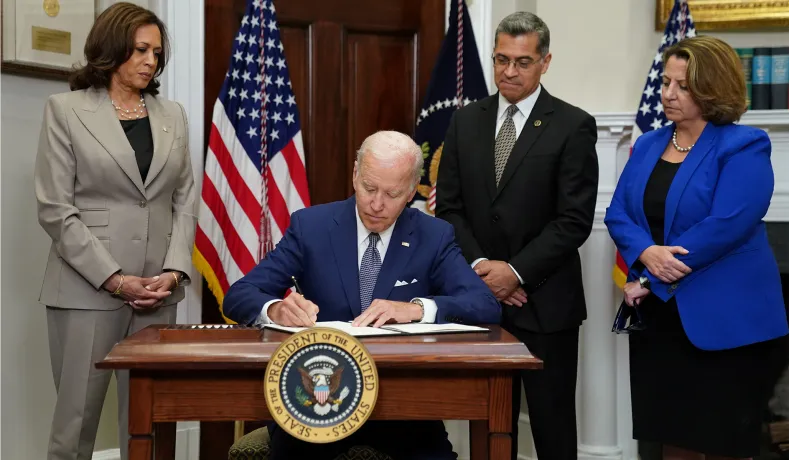
Published April 3, 2024
Last week, on behalf of the Food and Drug Administration, U.S. Solicitor General Elizabeth Prelogar made a surprising (and welcome) acknowledgment that “under federal law, no doctors can be forced against their consciences to perform or assist in an abortion.”
That acknowledgment came during the Supreme Court oral argument in FDA v. Alliance for Hippocratic Medicine, a case that involves whether doctors who have conscience objections to abortion have standing to challenge the FDA’s removal of safety standards for the abortion drug mifepristone. The doctors argue that the lack of safety standards has resulted in more women seeking follow-up care in emergency rooms where the doctors treat patients. As the doctors’ attorney, Erin Hawley, told the court, “FDA’s outsourcing of abortion drug harm to Respondent doctors forces them to choose between helping a woman with a life-threatening condition and violating their conscience.”
Prelogar argued for the FDA that it was speculative to say that any woman who took abortion drugs would seek care from respondent doctors, and “even if that happened, federal conscience protections would guard against the injury the doctors face.” According to the solicitor general, federal conscience protections provide “broad coverage” in these situations and act as a “backstop[].”
The FDA’s reliance on conscience protections in this case appears to be an attempt to provide the justices with a way to kick the case on standing and avoid ruling on the merits of whether the FDA acted illegally when it abandoned its own safety standards for mifepristone.
More than two dozen federal conscience laws protect health-care workers who object to participating in abortion or certain other medical interventions against their religious beliefs or moral convictions. But most of these laws are merely strings on federal funding and do not contain a private right of action allowing private parties to sue.
This means any “backstop” the conscience laws provide falls on the federal government. Respondent doctors are thus dependent on the Department of Health and Human Services, which oversees the FDA, and the Department of Justice to enforce the conscience laws and vindicate any violations of their rights. Before crediting the FDA’s theory that conscience laws act as a backstop, the Court should consider how HHS and the DOJ have guarded conscience rights in practice.
The Biden administration’s record on conscience protections, especially when it comes to abortion, is abysmal.
To start, President Biden appointed Xavier Becerra as secretary of HHS. As the California attorney general, Becerra was known for his radical pro-abortion positions and litigation targeting pro-lifers.
As secretary, Becerra has systematically undermined his department’s ability to enforce conscience laws. Since 2022, HHS’s budget has deprioritized funding for conscience and religion-freedom rights while simultaneously prioritizing the Biden administration’s pro-abortion policy goals, especially post-Dobbs.
Becerra stripped HHS’s Conscience and Religious Freedom Division of its independent ability to investigate violations of conscience and religious-freedom complaints and sidelined the division’s career staff experts from consulting on related issues. The division, which was created to guarantee enforcement of conscience and religious-freedom laws, was eventually eliminated completely and its staff reassigned. Becerra also removed the authority of the HHS Office for Civil Rights (OCR) to enforce conscience and religious-freedom protections under the Religious Freedom Restoration Act and the First Amendment.
HHS’s current “Conscience and Religious Nondiscrimination” webpage lists only three “recent actions” taken under the Biden administration (and no actions for over two and a half years). None of these three “actions” involve HHS enforcing federal conscience or religious-freedom protections for health-care workers.
First, a July 2021 letter informed the University of Vermont Medical Center that HHS was withdrawing a notice of violation of a nurse’s conscience rights. In 2019, OCR found that the hospital had violated the Church Amendments by forcing the nurse to participate in an abortion over her known conscience objection. The Church Amendments protect conscience rights of individuals and entities related to abortion and certain other health services. In 2020, after the hospital refused to change its policies to comply with the law, DOJ sued the hospital in federal court. But concurrent with HHS’s letter, DOJ dismissed the case without any settlement, agreement, or compensation for the nurse. According to the solicitor general, the Church Amendments provide the “most comprehensive protection” for doctors in the FDA case.
Second, an August 2021 letter informed California that HHS was withdrawing two 2020 notices of violation against the state and then-AG Becerra for violating federal conscience rights by forcing nuns and others to provide health-insurance coverage of abortion. Consistent with the federal funding strings of conscience laws, HHS had issued a disallowance of Medicaid funds after a finding of California’s “continued non-compliant status under the Weldon Amendment.” The Weldon Amendment prohibits discrimination against health-care entities that do not provide, pay for, provide coverage of, or refer for abortions. Adopting a new, narrower interpretation of what qualifies as a “health care entity,” HHS withdrew the disallowance.
Third, in September 2021, HHS issued guidance on the Church Amendments, emphasizing that the amendments protect “health care personnel who perform or assist in the performance of a lawful abortion.” The guidance provides four examples of personnel participating in lawful abortions; no examples are provided of health-care personnel who refuse to perform abortions. Notably, the guidance relies on pre-Dobbs abortion cases to define “lawful abortion,” which HHS has yet to update (or even note) in the almost two years since the Dobbs decision.
Fast forward to January 2024, when HHS issued a final rule titled “Safeguarding the Rights of Conscience as Protected by Federal Statutes.” While promising that it “takes seriously its obligations to comply with the Federal health care conscience protection statutes,” HHS removed substantive regulations, including definitions, enforcement procedures, and explanations of those statutes. These regulations were removed over many objections, including those of the doctors suing the FDA.
As documented in the brief I filed on behalf of Democrats for Life of America in the FDA case, HHS’s actions are part of a broader pattern and practice of the Biden administration’s weaponization of federal law to promote abortion and preempt state pro-life laws without regard for conscience rights.
Actions speak louder than words. And the Biden administration’s actions reveal that it does not guard health-care conscience rights.
The FDA’s backstop theory falls flat. In practice, there is no backstop for doctors who object to abortion. The Supreme Court should not credit the FDA’s empty acknowledgment. A backstop that stops nothing is no backstop at all.
Rachel N. Morrison is a Fellow at the Ethics and Public Policy Center, where she directs EPPC’s HHS Accountability Project. An attorney, her legal and policy work focuses on religious liberty, health care rights of conscience, the right to life, nondiscrimination, and civil rights.










